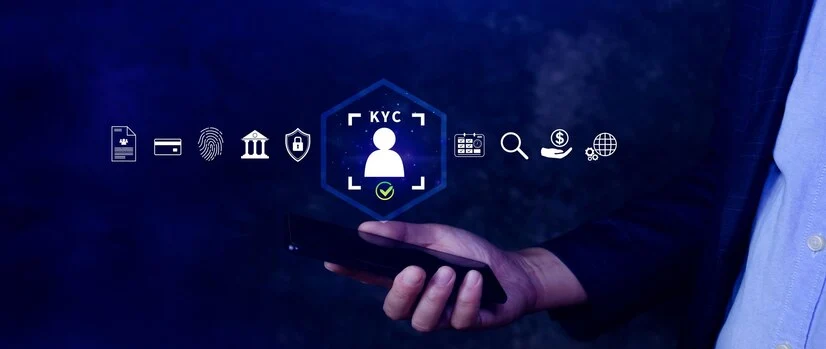In the ever-evolving world of cryptocurrency, the term Know Your Customer (KYC) is something you’re likely to encounter often. But what does it mean, and why is it so critical, especially in the world of Peer-to-Peer (P2P) Crypto? In this comprehensive guide, we will walk you through everything you need to know about KYC in the context of P2P crypto, helping you understand its importance, its role in enhancing security, and how it works.
Understanding P2P Crypto and its Role in Modern Finance
P2P crypto refers to Peer-to-Peer cryptocurrency exchanges, where users can trade directly with one another, without the need for an intermediary like a centralized exchange. It’s like buying and selling goods at a flea market, but in this case, the goods are digital assets like Bitcoin or Ethereum.
The role of P2P crypto in modern finance is rapidly growing. With more individuals seeking decentralized methods of trading, P2P platforms provide a way for users to have control over their trades while minimizing third-party involvement. However, this convenience comes with the responsibility of ensuring that both buyers and sellers are legitimate, and that’s where KYC comes in.
Related Article: KYC in P2P Crypto: The Essentials Explained
Why KYC is Crucial in P2P Crypto
KYC (Know Your Customer) is essential in P2P crypto transactions to prevent fraud, money laundering, and illicit activities. By verifying user identities, KYC enhances trust and security, reducing the risks associated with anonymous trading. This ensures a safer and more compliant ecosystem for both buyers and sellers.
The Need for KYC in Decentralized Platforms
On decentralized platforms, there is no central authority overseeing transactions, which makes them more vulnerable to fraud and illegal activities. Without proper verification, anyone can create multiple fake accounts to manipulate the market. That’s why KYC is essential in P2P crypto—it helps prevent fraud by confirming the identity of participants.
Regulatory Pressure and Compliance in the Crypto World
The world of cryptocurrency is still in its regulatory infancy. However, governments and financial authorities are increasingly tightening regulations on the crypto market. KYC is one of the tools that ensures that crypto platforms stay compliant with these regulations. Whether it’s to comply with anti-money laundering (AML) laws or to prevent financial crimes, KYC is a tool that bridges the gap between the decentralized nature of crypto and the structured requirements of financial regulations.
How KYC Protects Users and Platforms
Let’s dive deeper into the ways KYC safeguards both users and platforms.
Preventing Fraud and Money Laundering
KYC plays a pivotal role in preventing fraudulent activities and money laundering. By requiring users to verify their identity, P2P platforms ensure that no one is trying to use illicit funds or engage in money laundering. It’s like showing your ID before entering a bank—it ensures that no shady transactions are taking place.
Building Trust in Peer-to-Peer Transactions
In a P2P environment, trust is key. Without KYC, there’s no way to confirm that a person on the other end of a transaction is legitimate. By implementing KYC, platforms create a sense of trust among users. You know you’re dealing with a verified user, which ultimately makes for a safer and more reliable trading environment.
The KYC Process Explained: Step by Step
So, how does KYC work? Let’s break it down into simple steps.
Identity Verification: Key Components and Documents
The first step in the KYC process is identity verification. This typically involves providing personal details like your full name, date of birth, and address. You may also be asked to submit government-issued documents such as:
- A passport
- A driver’s license
- An ID card
These documents help platforms verify that the person registering is who they claim to be.
Proof of Address and Financial Source Checks
In addition to identity verification, users are often required to provide proof of address (like a utility bill or bank statement) to ensure their physical location is accurate. Some platforms also ask for financial source checks, which could involve submitting bank statements or proof of income to verify that the funds involved are legitimate.
How P2P Platforms Implement KYC Procedures
Each P2P platform has its own approach to implementing KYC. However, most platforms follow a similar procedure, which typically includes:
- Registration: Users create an account on the platform.
- Document Submission: Users upload their identity documents and proof of address.
- Verification: The platform’s KYC team reviews the submitted documents.
- Approval/Denial: If everything checks out, the user is approved for trading. If there are issues with the documents, they may be asked to provide additional information.
Case Studies of Popular Platforms (e.g., Binance P2P, LocalBitcoins)
Let’s take a look at how some popular platforms like Binance P2P and LocalBitcoins implement KYC.
- Binance P2P: Binance is one of the largest P2P platforms in the world. The platform requires users to complete KYC before they can start trading, which involves uploading documents such as an ID and proof of address. Binance has stringent measures in place to prevent fraud and ensure that all transactions are legitimate.
- LocalBitcoins: Similarly, LocalBitcoins is another well-known P2P platform. The KYC process here includes ID verification and sometimes additional checks, especially for high-volume traders. LocalBitcoins places a strong emphasis on user security and trust, making KYC an essential part of the platform.
The Role of KYC in Different Jurisdictions
KYC regulations vary across jurisdictions, reflecting different legal frameworks and risk tolerance levels. While some countries enforce strict identity verification to combat financial crimes, others adopt more lenient approaches to encourage innovation. These differences shape how crypto platforms operate globally.
How Different Countries Approach KYC in Crypto
KYC regulations can vary significantly depending on the country. In some regions, like the EU and the US, KYC is mandatory for crypto transactions above certain thresholds. In other places, like some parts of Asia, KYC may be more relaxed. The importance of understanding the local regulations cannot be overstated, as failure to comply could result in fines or the shutdown of a platform.
The Influence of FATF Recommendations
The Financial Action Task Force (FATF) is an international body that sets guidelines for combating money laundering and terrorist financing. FATF has recommended that crypto exchanges implement robust KYC procedures to curb financial crimes. Many jurisdictions adopt these recommendations as part of their regulatory framework.
Alternatives to Traditional KYC: Innovative Solutions
While traditional KYC processes involve submitting personal documents, new technologies are emerging that may offer more privacy and convenience.
Biometric Verification and Blockchain Solutions
Biometric verification, such as facial recognition or fingerprint scanning, could replace or supplement traditional KYC processes. Blockchain-based solutions are also being explored, allowing users to verify their identity without sharing sensitive data directly with platforms.
Decentralized Identity (DID) Systems and Their Potential
Decentralized Identity (DID) systems are gaining traction. These systems allow users to own and control their identity, reducing the need for third-party verifications. DID could revolutionize KYC by providing more privacy and control over personal data.
The Future of KYC in P2P Crypto
The future of KYC in P2P crypto is likely to balance security with privacy through innovations like decentralized identity solutions and AI-driven verification. As regulations evolve, platforms may adopt more seamless and user-friendly KYC processes while ensuring compliance. This shift could enhance trust without compromising decentralization.
Trends Shaping the Evolution of KYC
As crypto continues to grow, the future of KYC looks promising. We can expect:
- Increased use of AI and machine learning to improve the efficiency of the verification process.
- A shift toward decentralized KYC systems that give users more control over their data.
Potential for Increased Decentralization and Privacy Preservation
The trend toward decentralization in the crypto space is likely to lead to innovations in privacy-preserving KYC solutions. These developments may strike a balance between compliance and user privacy, making KYC less intrusive while maintaining its effectiveness.
KYC and the Rise of Privacy Coins
With the rise of privacy coins like Monero, there is a growing debate about how to balance privacy with KYC. Privacy coins offer anonymity, but KYC requirements may challenge this anonymity. As regulations tighten, platforms may need to adapt their KYC processes to better integrate with privacy coins.
Balancing Privacy with Regulatory Requirements
The real challenge moving forward will be finding a balance between maintaining user privacy and adhering to regulatory requirements. The rise of decentralized identity systems and blockchain-based solutions could be a key part of this solution.
Risks of Not Implementing KYC in P2P Transactions
Without KYC, P2P transactions become vulnerable to fraud, money laundering, and illicit activities, posing risks to both users and platforms. The lack of identity verification can lead to scams, regulatory penalties, and a loss of trust in the ecosystem. Ensuring proper KYC safeguards helps create a safer trading environment.
Legal and Financial Consequences for Platforms and Users
Not implementing KYC in P2P transactions can expose both platforms and users to significant risks. Legal consequences could include fines, suspension, or even closure of platforms, while users may face the risk of losing funds or becoming targets of fraud.
The Reputation Risk to Crypto Communities
Failure to implement KYC can also harm the reputation of the broader crypto community. If a platform is found to be engaging in illicit activities due to inadequate verification processes, it could damage the trust that users have in crypto platforms.
How to Safeguard Your Personal Data During KYC
To protect your personal data during KYC, only share information with reputable and regulated platforms that use strong encryption. Avoid storing sensitive documents on unsecured devices and enable two-factor authentication for added security. Being cautious about phishing attempts also helps prevent data breaches.
Best Practices for Ensuring Privacy and Security
To protect your data during KYC, follow these best practices:
- Use platforms with strong encryption and data protection measures.
- Ensure that the platform adheres to regulatory standards.
- Avoid submitting sensitive information on public or unsecured networks.
Choosing the Right Platforms with Strong Data Protection
Always choose platforms that prioritize your privacy and security. Look for platforms with solid reputations and ensure they are compliant with global regulations.
Final Thoughts
As cryptocurrency continues to grow, KYC will play a critical role in securing the space. While it presents challenges in terms of privacy, it’s also an essential tool for preventing fraud and maintaining trust. The future of KYC in P2P crypto will likely involve a blend of innovative technologies, stronger privacy solutions, and global collaboration to create a safer and more transparent crypto environment.
FAQs:
Q. What is the purpose of KYC in P2P crypto?
KYC in P2P crypto ensures the legitimacy of users and helps prevent fraud, money laundering, and other illicit activities.
Q. How does KYC affect user experience?
KYC may slow down the onboarding process but improves security and trust, leading to a safer trading environment.
Q. Can I bypass KYC on P2P crypto platforms?
No, most platforms require KYC to comply with regulatory standards. Skipping KYC could lead to account suspension.
Q. What happens if I fail KYC verification?
If you fail KYC verification, you may be unable to trade on the platform until you resolve the issue by submitting correct documentation.
Q. Are there alternatives to traditional KYC?
Yes, emerging technologies like biometric verification and decentralized identity (DID) systems are being explored as alternatives to traditional KYC.








